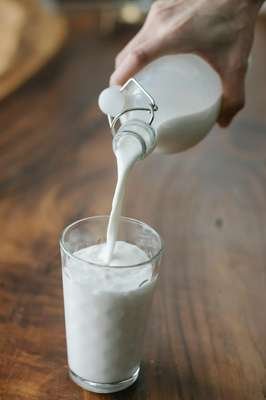Ensuring Milk Safety: Nationwide Testing in Response to Bird Flu Concerns
By
Veronica E.
- Replies 0
The United States Department of Agriculture (USDA) is taking bold steps to ensure the milk on your table is as safe as ever. As the federal agency responsible for safeguarding the nation’s food supply, the USDA has announced mandatory testing for bird flu—specifically the H5N1 strain—across dairy herds nationwide.
This urgent action reflects growing concerns about the virus's impact on livestock and potential risks to humans. For many in the GrayVine community, who remember the days of fresh milk deliveries to their doorsteps, trust in our food sources is paramount.
Under the new federal order, facilities handling raw milk, like bulk transporters and dairy processors, are required to submit samples for testing upon USDA request.
The initial phase of this program will target six states: California, Colorado, Michigan, Mississippi, Oregon, and Pennsylvania, starting December 16.

This testing aims to quickly identify affected herds and stop the spread of the virus among livestock. So far, the H5N1 strain has impacted 718 dairy herds across 15 states.
The USDA hopes this approach will give farmers and consumers confidence in the safety of dairy products while ensuring the well-being of the animals.
Additionally, an earlier requirement from April already mandates testing lactating dairy cows before interstate shipments and obliges reporting of positive cases by private labs and veterinarians.
Consumers, especially those who prefer raw milk, should be aware of the risks. The Centers for Disease Control and Prevention (CDC) advises against consuming raw milk due to potential contamination.
Fortunately, pasteurization effectively eliminates the virus, ensuring safe products for everyone.
The recent detection of bird flu in raw milk from a California farm led to a widespread recall, but no human cases were linked to the incident.
However, there have been 58 reported human cases of bird flu in the U.S., primarily among individuals who had direct contact with infected livestock.
On dairy farms, research shows that the virus can spread efficiently among mammals, with cows shedding it through their mammary glands.
While no evidence suggests human-to-human transmission yet, scientists are closely monitoring the H5N1 strain’s potential to evolve.
A recent study in the journal Science warns that a single mutation could make the virus more transmissible among humans, underscoring the importance of controlling its spread.
1. Stay Updated: Follow reliable news about bird flu and its impact on the dairy industry.
2. Choose Pasteurized Products: Always opt for milk and dairy products that have undergone commercial pasteurization.
3. Support Local Farms: Encourage local farmers to comply with safety testing to protect the community.
4. Practice Hygiene: If you’re around livestock, follow proper safety measures to prevent the spread of diseases.
The USDA’s actions are a reminder that safeguarding our health and food supply is a shared responsibility. By staying informed and making thoughtful choices, we can ensure our milk remains a safe and trusted staple in our diets.

Have you or someone you know been impacted by the recent bird flu outbreaks? What do you think about the USDA’s new testing mandate? And do you have any tips for making sure the milk you drink is safe? We’d love to hear your thoughts, experiences, and any questions you might have—feel free to share in the comments below!
This urgent action reflects growing concerns about the virus's impact on livestock and potential risks to humans. For many in the GrayVine community, who remember the days of fresh milk deliveries to their doorsteps, trust in our food sources is paramount.
Under the new federal order, facilities handling raw milk, like bulk transporters and dairy processors, are required to submit samples for testing upon USDA request.
The initial phase of this program will target six states: California, Colorado, Michigan, Mississippi, Oregon, and Pennsylvania, starting December 16.

Ensuring the safety of our milk supply—steps are being taken to protect what’s in your glass. Image Source: Pexels / Charlotte May
The USDA hopes this approach will give farmers and consumers confidence in the safety of dairy products while ensuring the well-being of the animals.
What This Means for Farmers and Consumers
For dairy farmers, a positive bird flu test means providing detailed information to help with surveillance.Additionally, an earlier requirement from April already mandates testing lactating dairy cows before interstate shipments and obliges reporting of positive cases by private labs and veterinarians.
Consumers, especially those who prefer raw milk, should be aware of the risks. The Centers for Disease Control and Prevention (CDC) advises against consuming raw milk due to potential contamination.
Fortunately, pasteurization effectively eliminates the virus, ensuring safe products for everyone.
The recent detection of bird flu in raw milk from a California farm led to a widespread recall, but no human cases were linked to the incident.
However, there have been 58 reported human cases of bird flu in the U.S., primarily among individuals who had direct contact with infected livestock.
What We Know About Bird Flu
For humans, bird flu symptoms have been mild, often including pinkeye, sneezing, or coughing. Some individuals may not exhibit symptoms at all. The CDC recommends testing for anyone exposed to the virus.On dairy farms, research shows that the virus can spread efficiently among mammals, with cows shedding it through their mammary glands.
While no evidence suggests human-to-human transmission yet, scientists are closely monitoring the H5N1 strain’s potential to evolve.
Staying Safe and Informed
As part of a generation that values safety and community, here are steps you can take to protect yourself and your loved ones:1. Stay Updated: Follow reliable news about bird flu and its impact on the dairy industry.
2. Choose Pasteurized Products: Always opt for milk and dairy products that have undergone commercial pasteurization.
3. Support Local Farms: Encourage local farmers to comply with safety testing to protect the community.
4. Practice Hygiene: If you’re around livestock, follow proper safety measures to prevent the spread of diseases.
The USDA’s actions are a reminder that safeguarding our health and food supply is a shared responsibility. By staying informed and making thoughtful choices, we can ensure our milk remains a safe and trusted staple in our diets.
Key Takeaways
- The USDA has announced that the national milk supply must be tested for bird flu.
- Raw milk handlers, such as bulk milk transporters and dairy processors, are required to collect samples and share them with the USDA for testing.
- There is increased urgency to control the spread of bird flu in livestock due to potential risks to human health.
- While no human bird flu cases have been linked to milk products so far, there is concern that the virus could evolve to spread more easily among humans, potentially leading to a pandemic.
Have you or someone you know been impacted by the recent bird flu outbreaks? What do you think about the USDA’s new testing mandate? And do you have any tips for making sure the milk you drink is safe? We’d love to hear your thoughts, experiences, and any questions you might have—feel free to share in the comments below!






